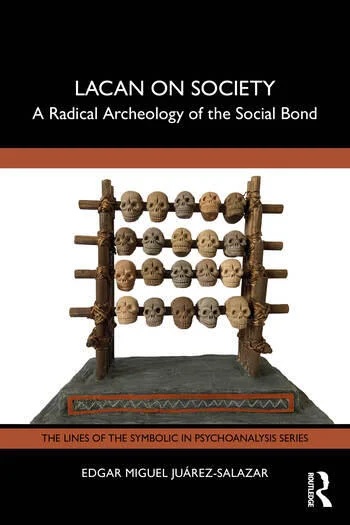Lacan on Society: A Radical Archeology of the Social Bond

Book Details
- Publisher : Routledge
- Published : 2025
- Cover : Paperback
- Pages : 188
- Category :
Psychoanalysis - Catalogue No : 98172
- ISBN 13 : 9781032673813
- ISBN 10 : 1032673818
Reviews and Endorsements
Despite so many attempts to claim Lacan’s theory for the purposes of emancipatory politics, there has hitherto been no systematic take on his notion of society. Did he develop one at all, and if so, what is its critical value for the present? Here, we finally have a volume that fills in this striking gap, and it does this in an admirable manner. Edgar M. Juárez-Salazar accompanies us through different stages of Lacan’s teaching, continuously demonstrating that each one contains an indispensable contribution to understanding the fragility of social bonds. In times, when these are being aggressively dismantled, a critical intervention like the one offered by Juárez-Salazar is a matter of urgency.
Samo Tomšič, University of Fine Arts Dresden
As Lacan well knew, the psychoanalytic clinic is a crowded place. There may only be two bodies there but, through the unfolding discourse of the analysand, and also through the learning, experience and assumptions of the analyst, a whole society congregates there. And yet, our focus in the Lacanian field is so often on the individualized subject. In this careful, insightful and immaculately researched book, Edgar M. Juárez-Salazar addresses this gap and provides us with a much needed exploration of the Lacanian social, bringing to think again about well-worn aspects of Lacanian theory and key moments in his developing theory.
Calum Neill, Edinburgh Napier University
Does society exist? If it does not, why are we so sure that it does? And how can Lacan help us to answer such questions? Proposing a ‘sociologery’, to match Lacan’s notorious concept of ‘linguisterie’, Juárez-Salazar attempts a very ambitious high-wire act: to provide a new modus operandi for social research. In a nutshell, the author wishes to harness the contingency, qua paradoxical ‘plurality of singularities’, that grounds what we usually call the social. The right book, on the right subject, at the right time.
Timothy Appleton, Camilo José Cela University, Madrid
Jacques Lacan famously claimed that “there is no sexual relation” and, most counterintuitively, he posited this adage as the axiom of the psychoanalytic endeavor. But wasn’t psychoanalysis supposed to be all about sexual relations? Edgar Juárez-Salazar extends this into “there is no social relation” and places this adage as the axiom of the exploration of the social – again counterintuitively, for isn’t society all about social relations? Hence his meticulous investigation into how can the social bonds be constructed on the basis of a non-relation, and how the non-relation points to a social real. From the primal horde to the mass society, from the lacking signifier to surplus enjoyment, from Lévi-Strauss to Marx, the investigation takes us through the complex texture of the psychoanalytic exploration of the social bonds.
Mladen Dolar, University of Ljubljana

